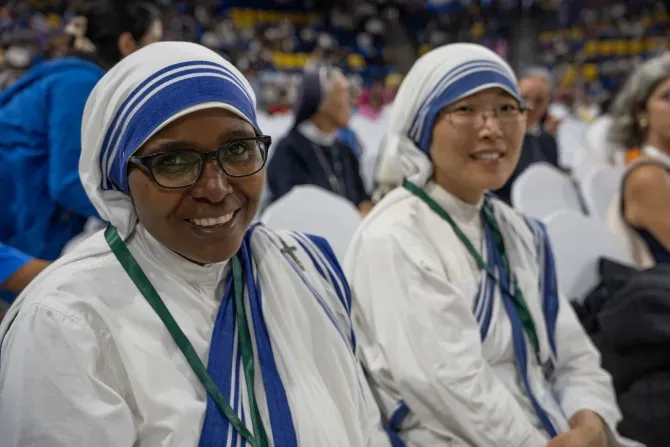Built in a former school building, the charity is supported by the Catholic prefecture of Ulaanbaatar, the Pontifical Mission Societies Australia, and the Catholic Mission.
In his address to volunteers from the House of Mercy and other Catholic charities in Mongolia, the pope illustrated his point with a story about St. Teresa of Calcutta.
“A journalist, seeing her bent over the foul-smelling sores of a sick person, once told her, ‘What you do is beautiful, but, personally, I wouldn’t do it even for a million dollars,’” Pope Francis recalled. “Mother Teresa smiled and replied, ‘I wouldn’t do it for a million dollars either. I do it for the love of God!’”
“I pray that this kind of gratuitous love will be the “value added” of the House of Mercy,” he said.
Pope Francis praised the act of volunteering — what he called “a purely generous and selfless service that people freely choose to offer to those in need, not out of concern for financial remuneration or personal benefit, but out of pure love of their neighbor.”
“This is the style of service that Jesus taught us,” he emphasized, adding that “the true progress of nations” should be measured not by economic growth but by the ability to provide health, education, and integral growth to one’s people.
“Therefore, I would like to encourage all the citizens of Mongolia, who are well known for their generosity and capacity for self-sacrifice, to engage in volunteer work, placing themselves at the service of others,” he said.
 Pope Francis greets a boy during a visit to the House of Mercy, a new charitable effort in Ulaanbaatar, Mongolia, on Sept. 4, 2023. Vatican Media
Pope Francis greets a boy during a visit to the House of Mercy, a new charitable effort in Ulaanbaatar, Mongolia, on Sept. 4, 2023. Vatican Media
The pope also addressed what he called three “myths” about charitable activities. Two of these myths, he said, are that only those with money can engage in volunteer work, or that the only way to care for others is through hiring salaried staff. Another myth is that the Catholic Church performs works of charity only to persuade people to become Christian.
“No ... Christians do whatever they can to alleviate the suffering of the needy, because in the person of the poor they acknowledge Jesus, the Son of God, and, in him, the dignity of each person, called to be a son or daughter of God,” he said.
 Pope Francis blesses the sign of a new charitable effort, the House of Mercy, in Ulaanbaatar, Mongolia, on Sept. 4, 2023. Vatican Media
Pope Francis blesses the sign of a new charitable effort, the House of Mercy, in Ulaanbaatar, Mongolia, on Sept. 4, 2023. Vatican Media




 Pope Francis greets a boy during a visit to the House of Mercy, a new charitable effort in Ulaanbaatar, Mongolia, on Sept. 4, 2023. Vatican Media
Pope Francis greets a boy during a visit to the House of Mercy, a new charitable effort in Ulaanbaatar, Mongolia, on Sept. 4, 2023. Vatican Media


